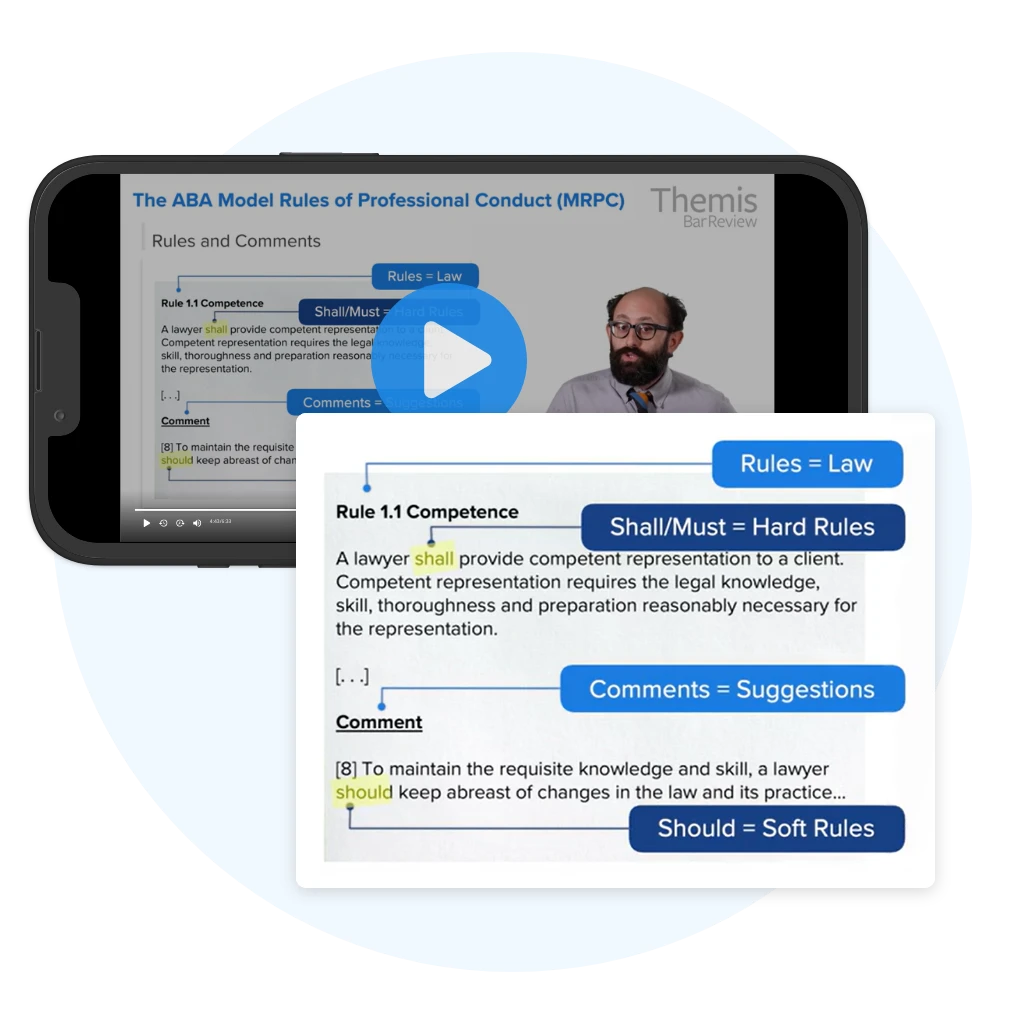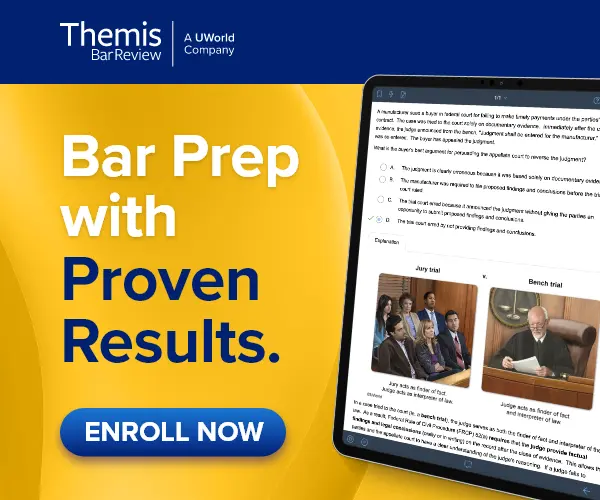Tackling the MPRE with Confidence
Passing the Multistate Professional Responsibility Examination (MPRE®) is required for admission to every U.S. jurisdiction with the exceptions of Puerto Rico and Wisconsin. Whether you’re taking the MPRE for the first time or need to increase your score, the following tips will help you develop confidence for exam day.
What is the MPRE?
The MPRE has been developed by The National Conference of Bar Examiners (NCBE®) to ensure that bar candidates understand the professional rules of conduct and the procedural and evidentiary rules established by federal and state cases.
Structure
The MPRE is a 2-hour, 60-question computerized multiple-choice exam administered at Pearson VUE testing sites. Of the 60 questions, 50 are scored. The remaining 10 are pilot questions for future exams. MPRE subjects and subject weights are as follows:
| MPRE Subjects | % | # |
| Regulation of the legal profession | 6-12% | 5-8 |
| The client-lawyer relationship | 10-16% | 5-8 |
| Client confidentiality | 6-12% | 3-6 |
| Conflicts of interest | 12-18% | 6-9 |
| Competence, legal malpractice, and other civil liberty | 6-12% | 3-6 |
| Litigation and other forms of advocacy | 10-16% | 5-8 |
| Transactions and communications with persons other than clients | 2-8% | 1-4 |
| Different roles of the lawyer | 4-10% | 2-5 |
| Safekeeping funds and other property | 2-8% | 1-4 |
| Communications about legal services | 4-10% | 2-5 |
| Lawyers’ duties to the public and the legal system | 2-4% | 1-4 |
| Judicial conduct | 2-8% | 1-4 |
Registration
The NCBE administers the MPRE three times a year, in March, August, and November. You can typically register for the MPRE in December for the following year. Applications must be submitted by 11:59 pm CT on the registration deadline with a $185 registration fee (for 2026 dates). To register, you must create an NCBE account, apply for MPRE test accommodations (if applicable), and request authorization to test via your account. Deadlines are as follows:
| Test Administration | Registration Deadline |
| March 24 or 25, 2026 | January 22, 2026 |
| August 11 or 12, 2026 | June 11, 2026 |
| November 12 or 13, 2026 | September 17, 2026 |
5 MPRE Preparation Tips
- ABA Model Rules of Professional Conduct
- ABA Model Code of Judicial Conduct
- Constitutional decisions established in leading federal and state cases
- Generally accepted principles established in leading federal and state cases
- Attorney
- Subject to discipline
- May/Proper
- Subject to litigation sanction
- Subject to disqualification
- Subject to civil liability
- Subject to criminal liability
- Disciplinary authority
- Lawyer-client relationship
1. Study Smart
You’ll notice in the chart above that some topics carry more weight than others. For example, “Conflicts of Interest” and the “Client-Lawyer Relationship” make up a potential 34% of the exam. Of course, you should study each subject thoroughly, but paying special attention to high-yield subjects can increase your chances of getting a high score.
2. Know the Rules
You can’t start practicing questions if you haven't developed some foundational knowledge. First, you should actively review and seek to understand the rules:
3. Learn Key Words and Phrases
You may come to know the law well, but if you don’t know the nuances of legal terms, you could misunderstand a question and its answers. Fortunately, the NCBE provides a list of must-know keywords and phrases for the MPRE. They include, but are not limited to, the following:
4. Take Professional Responsibility in Law School
A Professional Responsibility course will typically cover the Model Rules of Professional Conduct and the Model Code of Judicial Conduct in detail. Taking this course in law school will ground you in the subject and help you better retain its content through classroom debates, lectures on real-life scenarios, and discussions.
5. Take Practice Tests
Once you’ve become familiar with the exam content, it’s time to start practicing. The best way to practice is by simulating the exam as closely as possible. That means studying with questions that reflect the exam in both difficulty and format.

6. Bonus Tip — Sign-Up for Free MPRE Review
Themis provides free MPRE review that gives you every tool you need to know to pass the MPRE, including an outline, a lecture with an interactive handout, multiple practice exams, and over 200 practice questions with detailed answer explanations developed by Themis experts.
5 Exam Day Tips
- Contradict the facts
- Go against your common sense of how the rules could play out in real life
- Don’t directly respond to the call of the question
1. Pay attention to the call of the question
After you’ve read through the fact-pattern, pay careful attention to the call of the question. MPRE questions often use similar calls like “Is the lawyer subject to discipline?” or “Is the lawyer’s conduct proper?” This is where knowing your MPRE keywords and phrases will help you. Consider what the call is asking, and ask yourself whose conduct should be evaluated.
2. Eliminate answer choices
Eliminating answer choices you know are wrong is good practice on any exam. As you analyze an MPRE question, root out answer choices that:
3. Think before you choose
Think of the potential answer before you look at the answer choices. MPRE answer choices may try to trick you, but reading them with an answer already in mind will help you avoid such trickery.
4. Keep Track of Time
You have 2 hours to answer 60 questions. That means you should answer about 15 questions per half hour. It’s better to pick up the pace than leave 10 questions blank because you ran out of time. Train your pacing by setting a timer when you take practice tests.
5. Be Prepared
The better prepared you are for exam day, the less stress you’ll feel during the exam. Get a good night's sleep. Do a relaxing morning routine. But most importantly, stay updated on the most recent test day policies.
Recent Posts
Law School Outlining for Final Exams: Apply, Don’t Memorize
1L November Playbook: Use Your Law School Outlines to Finish Strong
Law School Note taking: Five Things That Belong in Your Class Notes
Elements = Legally Significant Facts
How to Recover After a Difficult Law School Semester
Best Study Strategies for Neurodivergent Law Students
7 Highly Effective Memorization Techniques for the Bar Exam
7 Legal Writing Tips for Law Students
The Art of Outlining for 1L Final Exams
Balancing Academics and Extracurriculars: Time Management Tips for 2L Students
7 Strategies to Prepare for the Socratic Method During 1L Year
How to Make a Bar Exam Study Schedule | 5 Tips with Examples
A Law School Student’s Guide to Stress and Burnout
Ace Your 1L Exams: 9 Actionable Tips from an Attorney
Tackling the MPRE with Confidence
A 1L Student's Guide to Legal Language
Navigating Your First Year of Law School: Tips for Success
Trust, Transparency, Results: The How and Why of Themis Pass Rates
Holiday Party Etiquette Advice for Almost Lawyers
Halloween Costumes That Only a Lawyer Could Love
Secrets To Breaking Through The 'Breaking Points' of Law School and Beyond
Brutally Honest 1L Advice From A Brilliant, Bitterly Brunette Attorney
2L/3L Life: 10 Preach-Free Pieces of Advice for Almost Lawyers



